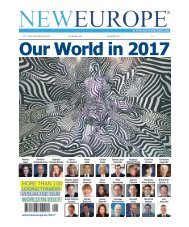Our World in 2018
Leading minds reflect on the state of our societies, and examine the challenges that lie ahead. An edition dedicated to generating ideas that will help form a new vision for our world.
Leading minds reflect on the state of our societies, and examine the challenges that lie ahead. An edition dedicated to generating ideas that will help form a new vision for our world.
You also want an ePaper? Increase the reach of your titles
YUMPU automatically turns print PDFs into web optimized ePapers that Google loves.
.
of hundreds of millions of people in Asia, Latin
America and Africa are improving, that doesn’t
mean that people are content. And it became
clear that economic progress and prosperity do
not always buy political stability.
The global wave of political anger sweeping
many rich and poor countries alike is also fed
by a newfound impatience with corruption. In
the last decade, societies in which corruption
used to be treated as a fact of life developed
ousted once untouchable politicians. In Brazil
and India, Russia and Spain, people took to
the streets to denounce corruption by the
powerful.
And too often those in power were also
leaders of traditional political parties. When
such leaders are caught stealing, it becomes
another stain on parties, whose prestige and
allure has been steadily waning. These days,
political parties are seen not as natural habitats
for idealists but for fast-talking and often
hypocritical opportunists and careerists.
The disdain for politics as usual — and
therefore for parties locked in the status quo —
is intense, widespread, global. This is why antipolitics,
the rejection of traditional politics and
its practitioners, is such a popular instinct today.
The case of Tiririca vividly illustrates
why. In 2010 Francisco Everardo Oliveira
Silva, known professionally as Tiririca the
clown, ran for a congressional seat in Brazil,
campaigning in costume. His message was
honest and straightforward: “I don’t know what
a representative in Congress does, but if you
send me there I will tell you.” He also explained
that his goal was “to help people in need in this
country … but especially my family.”
At the time, it was easy to dismiss Tiririca’s
run as an extreme anti-political gesture that
could happen only in a rowdy young democracy
like Brazil’s. But not for long. The sentiment
that propelled Tiririca to victory is similar to
that which drove the political success of the
comedian Beppe Grillo in Italy, or that of Mr.
Trump, a reality TV show host.
Both men were able to undermine the
power of dominant parties. While Mr. Grillo’s
Five Star Movement sought to displace Italy’s
political machine by positioning himself as a
Moisés
Naím
Moisés Naím is a
distinguished fellow
at the Carnegie
Endowment for
International
Peace, Venezuela’s
former minister of
Trade and Industry
and author, most
recently, of “The
End of Power: From
Boardrooms to
Churches to States,
Why Being in Charge
Isn’t What It Used
to Be.
OUR POLITICAL SOCIETIES
radical outsider, Mr. Trump took on traditional
politics as a radical insider, staging a hostile
takeover of the Republican Party.
Mr. Trump’s appeal to “drain the swamp” in
Washington. Mr. Grillo’s scorching denunciation
of the “caste” that in his view ran Italy to the
ground. Demonstrators’ banners in Brazil
imploring voters to “throw them all out.” These
examples resonate in similar ways.
These days, calls for a new political order
usually require the ouster of political parties
and elected leaders, and in many cases that
is the correct call. Corrupt and ineffectual
ones.
Yet many activists harbor the misconception
that the answer lies in nongovernmental
organizations, or in loose, nonhierarchical
movements.
Democracies, however, need political
parties. We need permanent organizations
that earn political power and govern, that are
forced to articulate disparate interests and
viewpoints, that can recruit and develop future
government leaders and that monitor those
already in power.
Political leaders need to have a stance on
preschool education and nuclear weapons,
health care and agriculture, and have wellarticulated
views on fighting terrorism and
regulating banks, among myriad other policy
issues. And political parties are the training
camps of these leaders.
To survive, political parties must regain
the ability to inspire and mobilize people —
especially the young — who might otherwise
disdain politics or prefer to channel whatever
political energy they have through single-issue
groups. Parties must be willing to overhaul their
structures, mind-sets and methods to adapt
to a new world. We also need to bring party
renewal to the foreground in any discussion of
contemporary politics.
I
everything we do — eating, reading, shopping,
dating, traveling and communicating — was
disrupted by new technologies and innovation.
Everything, that is, except the way we govern
ourselves.
We need a disruptive innovation that pulls
democratic parties into the 21st century.
OUR WORLD | 2018
© 2018 Moisés Naím. Distributed by The New York Times Syndicate
129










